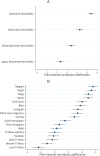The political, psychological, and social correlates of cryptocurrency ownership
- PMID: 38959184
- PMCID: PMC11221751
- DOI: 10.1371/journal.pone.0305178
The political, psychological, and social correlates of cryptocurrency ownership
Abstract
Cryptocurrency is a digital asset secured by cryptography that has become a popular medium of exchange and investment known for its anonymous transactions, unregulated markets, and volatile prices. Given the popular subculture of traders it has created, and its implications for financial markets and monetary policy, scholars have recently begun to examine the political, psychological, and social characteristics of cryptocurrency investors. A review of the existing literature suggests that cryptocurrency owners may possess higher-than-average levels of nonnormative psychological traits and exhibit a range of non-mainstream political identities. However, this extant literature typically employs small nonrepresentative samples of respondents and examines only a small number of independent variables in each given study. This presents the opportunity for both further testing of previous findings as well as broader exploratory analyses including more expansive descriptive investigations of cryptocurrency owners. To that end, we polled 2,001 American adults in 2022 to examine the associations between cryptocurrency ownership and individual level political, psychological, and social characteristics. Analyses revealed that 30% of our sample have owned some form of cryptocurrency and that these individuals exhibit a diversity of political allegiances and identities. We also found that crypto ownership was associated with belief in conspiracy theories, "dark" personality characteristics (e.g., the "Dark Tetrad" of narcissism, Machiavellianism, psychopathy, and sadism), and more frequent use of alternative and fringe social media platforms. When examining a more comprehensive multivariate model, the variables that most strongly predict cryptocurrency ownership are being male, relying on alternative/fringe social media as one's primary news source, argumentativeness, and an aversion to authoritarianism. These findings highlight numerous avenues for future research into the people who buy and trade cryptocurrencies and speak to broader global trends in anti-establishment attitudes and nonnormative behaviors.
Copyright: © 2024 Littrell et al. This is an open access article distributed under the terms of the Creative Commons Attribution License, which permits unrestricted use, distribution, and reproduction in any medium, provided the original author and source are credited.
Conflict of interest statement
The authors have declared that no competing interests exist.
Figures











References
-
- Rosen A. What Is Cryptocurrency? A Guide for Beginners. Nerdwallet [Internet]. 2023. May 22, 2023. Available from: https://www.nerdwallet.com/article/investing/cryptocurrency.
-
- Shayegan MJ, Sabor HR, Uddin M, Chen C-L. A Collective Anomaly Detection Technique to Detect Crypto Wallet Frauds on Bitcoin Network. Symmetry. 2022;14(2):328. doi: 10.3390/sym14020328 - DOI
-
- Nabilou H. Bitcoin governance as a decentralized financial market infrastructure. Stanford Journal of Blockchain Law & Policy. 2020;4:26–51.
-
- Kerr E. 1/3 of the American Population Still Think Cryptocurrencies Are Ponzi Schemes. Bankless Times [Internet]. 2023. 5/22/2023. Available from: https://www.banklesstimes.com/news/2022/11/03/13-of-the-american-populat....
-
- Sonkurt H ALTINÖZ A. Cryptocurrency investment: A safe venture or a new type of gambling? Journal of Gambling Issues. 2021;47.
MeSH terms
LinkOut - more resources
Full Text Sources

